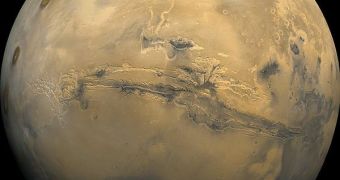According to the conclusions of a new scientific study, it would appear that our neighboring planet managed to somehow grow to half of its final size in just 2 million years, back when the solar system was still in its infancy.
This type of massive growth spurt is not common in planetary formation, which usually takes a while. In order to grasp the implications of these findings, we must first consider the way planets in our solar system are understood to have formed.
Shortly after the star condensed from its stellar nursery, the massive amount of hydrogen gas and cosmic dust that was left over after this happened organized itself in a circular structure, called the protoplanetary disk.
Inside this disk, material started clumping together, gathering more and more mass until finally objects known as planetary embryos developed. These structures had average diameters of 600 to 3,000 miles (1,000 to 5,000 kilometers).
After this stage was complete, these planetary embryos began colliding with each other, producing massive impacts that eventually led to the formation of fully-fledged planets. As far as Earth is concerned, the last such impact is believed to have given birth to the Moon.
This impact, featuring a Mars-sized object, took place about 50 million to 150 million years after the solar system was born, Space reports. These data were extracted from readings collected on numerous planets and moons, and augmented with computer models.
But the simulations fail to explain why Mars is so small in size. The new study proposes that the object is in fact a protoplanet, an early solar system structure that somehow escaped collisions with neighboring planetary embryos.
More than 50 percent of the mass Mars currently contains was accreted from the protoplanetary disk in just 1.8 million years, the new research shows. “Mars is an embryo,” scientist Nicolas Dauphas puts it bluntly.
“When we look at that planet, we in fact look at the same material that made the Earth,” adds the geochemist, who holds an appointment at the University of Chicago.
Details of the new study were published in the May 26 issue of the top scientific journal Nature.

 14 DAY TRIAL //
14 DAY TRIAL //